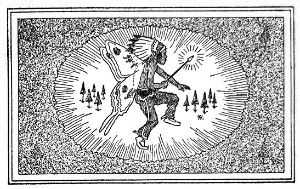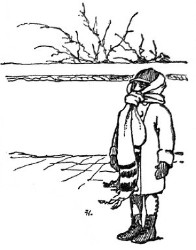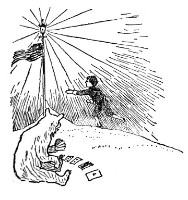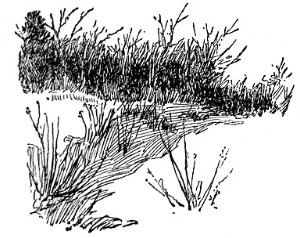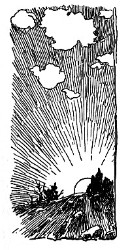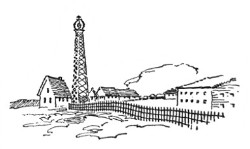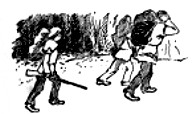| Copyright, Kellscraft Studio 1999-2005 (Return to Web Text-ures) |
Click
Here to return to The Magic Forest Content Page |
 (HOME) |
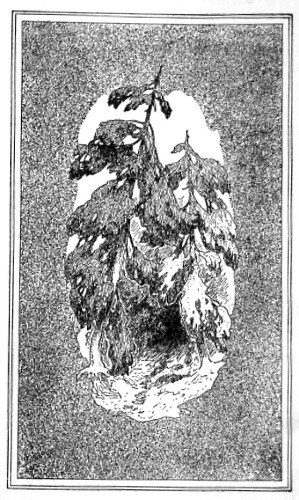 CHAPTER I
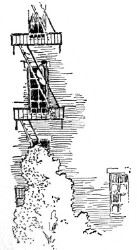
WHEN
James Ferris was only
five years old, he slipped from his bed, pattered barefooted
through the
bedroom and down the hall, and was finally reclaimed by an
excited
mother just
as he was about to crawl through the window on to the sloping roof of
the
veranda. James was promptly spanked, although he disclaimed
all knowledge of
the episode. About a year later he left his sleeping-car berth, and was
only
restrained All by the porter from stepping off the moving train. At the
age of
seven he horrified his family by climbing down four stories of a hotel
fire-escape. The third coincidence set his mother's wits to work. After
a time
it became fully established that Jimmy Ferris was a somnambulist, or
sleep-walker.
Jimmy did not know this. It was considered best to keep him in ignorance of the fact. The recurrence of his night prowlings was rare, and after his condition became recognized, he was never awakened. In fact, until the age of nine, at which time this story opens, he had made but six such excursions. Aside from this
unfortunate
tendency, he had never been very strong. 
His passion had always been for out-of-door life, and that would have been the very best thing for him; but his mother was too worried about him. She exercised a general supervisory authority over such things as rubbers, flannel bands, sponge cake, and oatmeal, which convinced Jimmy that mortal man would die if his feet got wet or if his diet were in the least irregular. It is natural for a boy to pattern his mental cast by that of his mother, and Jimmie's mother was very anxious. Indeed, about this time she imagined that Jimmie's lungs were weak, and so nothing would do but that they must all go to Monterey for the summer and Santa Barabara for the winter. As Jimmy's great but thwarted ambition had always been to see the "big woods," he was more than delighted. They set out by the Canadian
Pacific railroad early in May. Jimmy was at the car window all
of the daylight
hours, marvelling at the Canadian country, the stretches of forest, the
numerous lakes. North of Lake Superior he was surprised to see still a
great
deal of snow lying in the hollows, and in fact, late one afternoon, the
big,
white flakes began to zigzag slowly through the air. Jimmy was filled
with
wonder. A snow-storm in May!
All
the afternoon he
flattened his little nose against the window, his eye wide
with the mystery of
the forest. He could see into it just about ten feet, but who knew what
lay
beyond that? His restless mind conjured up the hollows, the
streams, the
springs, the wild beasts. Up in through that country lay the Long Trail
to the
fur regions. At Sudbury, late in the afternoon, he had glimpsed a voyageur
just from the wilds. The man had worn a fur cap with the tail hanging
down
behind! He had been wrapped in a long blanket coat bound with a red
sash, and
his feet were encased in beaded moccasins! Jimmy's mind went
galloping off on
the leagues of the Long Trail and after he had gone to bed he dreamed
of it. He
too travelled in the Silent Places. About five o'clock in the
morning the train paused an instant because the driving wheels could
not grip
the slippery rails on the grade. The engineer promptly turned on his
sand. Five
minutes later he had forgotten the circumstance. But in that pause something had happened. Jimmy Ferris, travelling the Trail in imagination, had wandered down the aisle of the car, had stepped from the platform at precisely the moment the engineer reached for his sand lever, and was now blundering aimlessly through the falling snow, over rolling bald hills, clad only in his slippers, a pair of trousers, and his nightgown, firmly convinced in his own mind that he was discovering the North Pole. 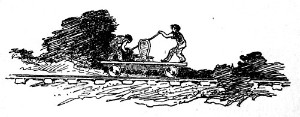 Two hours and a half
later, which
of course meant seventy or eighty miles farther on, Mrs.
Ferris discovered her
son's berth empty. Then there was trouble! Telegrams, questions,
conjectures,
flew. Section men scurried over every inch of the track on hand-cars,
thinking
to find Jimmy's mutilated body. He was evidently not on the train: it
seemed
impossible that he could have left it while moving without receiving
some
injury. Nobody remembered that labored moment when the engine had
coughed its
protest of the grade. No sign nor clew could be discovered. Mrs. Ferris
was
prostrated; Mr. Ferris stricken to the heart; everybody else was
supremely
puzzled. Jimmy had simply vanished into thin air.
In
the meantime Jimmy went
on discovering the North Pole, and the arctic weather became
more and more
severe. He was just on the point of plucking the pole to take home with
him,
from which happy event he was being prevented however by the
numbness
of his hands, when he awoke and
looked about him. He knew perfectly well he
was no longer dreaming, but for a moment he seriously doubted whether
he was
alive. His last moments of consciousness had felt the yielding of a
Pullman
berth, had heard the regular clinkety-clank of the car wheels,
had seen the
thin crack of light that swayed between his curtains. And here all at
once he
was out on a gray, bleak, boulder-strewn hillside, without a
sign of berth, or
car, or even track anywhere within sight. You must remember that he
knew
nothing whatever of his sleep-walking propensities. He could
not summon to his
bewildered brain even a wild solution of the affair. Before him stretched a
mistlike forest country, indistinct in the early light, about whose
skeleton
branches lingered a faint, wraithlike fog. And all about him was a
great
silence. 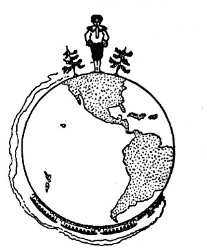
He was not frightened; the
whole thing was too unexplained for that, and, being unable to
account for
himself in any way, he was as yet unterrified by a feeling of
responsibility.
But he was very cold. His thin slippers, which he had instinctively
assumed
before setting out to discover the North Pole, were wet through by the
damp
snow; his bare shanks were goose-fleshed, and a thin, cotton nightgown
and a
pair of
knee breeches are not
precisely
an early May costume in the North. Having been taught that damp feet
meant
pneumonia and inadequate clothing consumption, Jimmy immediately gave
himself
up for lost. "I must get back," he said to himself. Get back where? He had never
seen this country before. That Pullman car might be on the other side
of the
world. For a moment he imagined he might be dead, but. then a
certain sturdy
little piety of his own came to his aid.
It was not that. But since the human mind must have
explanations or perish,
and since Jimmy was only nine years old and more conversant with Grimm
and
Andersen than with medical authorities, and since sorcery is
after all much
nearer to the hearts of most of us than such a stupendous metamorphosis
as
this, he shortly concluded that he was living a fairy tale and that
this must
be the Magic Forest. In that case he must go
somewhere. He struck out sturdily, his mind quite at rest from the
fears that
would have assailed it had he been lost in an ordinary and
comprehensible
manner. 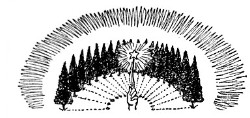
Of
course he set out in the
wrong direction. Even had he known enough to follow a back
track, it would
have been impossible for him to have done so. The back track
was covered by
the light fall of snow. Travel was difficult enough and
uncomfortable enough
in any direction, but level places are easier than hills. Accordingly,
Jimmy
took his way down toward the wraith of vapor, and so,
shortly
after an hour's stumbling through a fringe of wood, found
himself on the banks of a brawling north country river. By
this time the sun
was well over the horizon, the clouds had scattered, and
Jimmy's blood was
circulating, so that, had he only known it, the danger of pneumonia or
a
harmful chill had passed. But Jimmy did not know it.
He only knew that the repeated contact with melting snow had turned his
feet
positively blue, that his thin, wet garments sent a spasm of cold
through his
body every time a new movement brought their smooth clamminess next his
skin in
a fresh place, that the wood's brush had scraped and torn his skin
cruelly.
Once something abrupt and strange had glided away like a streak of
brown from a
thicket before him, startling him into a cry, which returned from the
great
silence to strangle in his throat. Now he stared in helpless
bewilderment at
the swift stream, and wondered what new thing he must do. It
would not have
surprised him to have been whisked back at any moment to his berth in
the
Pullman car. Above the little stone beach on which he stood, the river
boiled
and tumbled and whirled down a slope strewn with big and little
boulders. The
water was broken into foam, slid in a smooth green apron, twisted in
savage
eddies. The pool before him was filled with white froth. And Jimmy was a
very lonesome little boy in a great,
strange place. 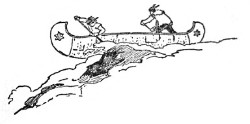
Suddenly
at the extremity of
the vista something sprang into view and came shooting down the hurried
waters.
It stopped abruptly, worked jerkingly sideways, to slant with
terrific impetus
across the smooth apron. Jimmy's bewildered vision made out a canoe, a
birch-bark canoe of bright yellow with up-curved bows, of the sort he
had seen
pictures of in his father's Parkman.
It contained two men. As the canoe
leaped nearer and nearer, the men came more plainly into view. Their
bold,
copper-colored faces were set in rigid lines of attention, their beady
black
eyes were fixed unwaveringly on the difficulties of the descent, their
sinewy
brown hands wielded long paddles whose blades were colored vermilion. 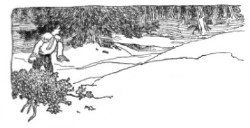
Both
wore their hair long
about the napes of their necks and over their ears, and bound it in
place by
bands about their foreheads. Even before the boy's quick faculties had
sensed
these things, the craft had reached a spot where the current divided
about a
great boulder to tumble over a sunken ledge in a cataract. The men
simultaneously rose to their knees and thrust at their paddles in one
superhuman effort. The canoe quivered, jumped sideways, shot forward
just to
clear the boulder, and rushed on the cataract. "Ae! hi, hi, hi-yah!" shrieked the men in an ecstasy. 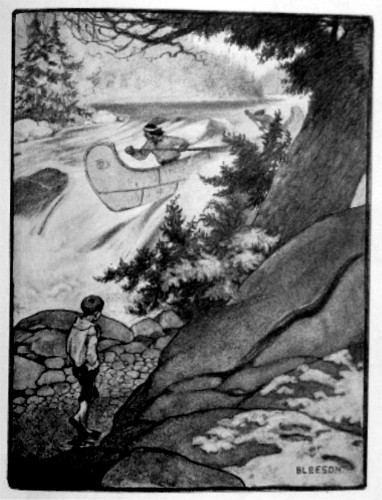 "The canoe quivered,... and rushed the cateract." The
craft leaped directly
out in the air. A smother of spray arose. It floated
peacefully in the eddy of
the pool.
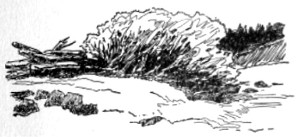
Another canoe appeared,
another, then two, all rushing down the current, all taking
the leap. The air
was full of shoutings, of laughter. Some set to work at once
bailing water,
others looked eagerly up-stream to watch their successors shoot the
rapids.
Almost instantaneously, as it seemed, the empty place was alive. And
the little boy,
shivering in the shadow of the wood, shivered still more with mingled
terror
and delight; for now he saw that these were Indians, the wild Indians
of the
woods, of a hundred years ago, whose wigwams had given place to the New
York he
knew, about whom his father had read to him in Cooper, come back from
the mysterious,
romantic past to traverse the Magic Forest. He was frightened, and yet
he was
glad. They were Indians, and yet they looked kind. He did not know
whether to flee or whether to reveal
himself and ask for aid. 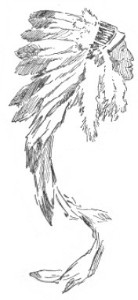
The trouble of a
decision
was saved him, however. The keen eyes of the savages did not long
overlook him.
Instantly he was surrounded by a curious group, eager to know the
meaning of
his appearance. The strange, handsome men in
moccasins talked to one another in beautiful singing
syllables; then an old
man knelt before him. "You get los'?" he
asked laboriously. Jimmy only stared. You see he really did not know
himself. "Where you liv'?" "New York,"
replied Jimmy. "New Yo'k," they
repeated to one another, puzzled. They thought they knew the place, for
far up
on the shores of the Hudson Bay is a fur-trading post called York Factory.
But how did this
child come to be here? "You go dere now?"
inquired the old Indian after a moment. He spoke swiftly to his
companions. "You wan' go to
York?" he asked. "Yes! Yes!" cried
Jimmy. "A' right,"
replied the Indian. "Is it far?" asked
Jimmy. 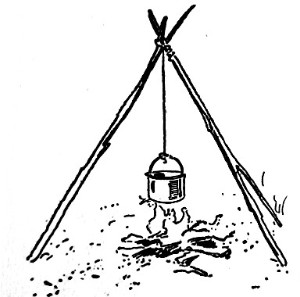
"Ver'
far." In the
meantime a little fire had been built, over which already a
tin pail was
bubbling. After a moment the Indian gave Jimmy a tin cup. "Drink him," said
he. It was tea, coal-black,
red-hot, without sugar and cream. Jimmy had never been allowed to drink
tea at
home, but he gulped this down, almost scalding his throat in the
process, and
at once felt better. While thus engaged, other Indians came through the
woods,
bearing heavy packs by means of straps passed across their foreheads.
Other
canoes, managed no less skilfully by women, shot the rapids. Children,
half-grown youths, girls, dogs, joined the group. A soft lisp of
excited
conversation arose. Old Makwa, the Indian who had interrogated Jimmy,
told them what he had learned. It was
surmised that the boy had become possessed by homesickness and
had
started for York Factory on
foot, ignorant
of the length of the journey; or perhaps that he had been lost
from a party
already well on its way toward that distant post. The band had
just been in to
trade its furs at Chapleau. It could not return south. Makwa cut the discussion
short. There was occasion for haste. He unceremoniously bundled thinly
clad
little Jimmy in a robe and deposited him gently in the waist of his
canoe. The
boy was well with them. Later, perhaps, when they returned to Chapleau
in the
fall. 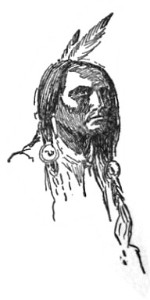
He thrust the canoe strongly
into the current. It shot away. Ah-kik, the bowsman, headed it
down-stream.
The paddles dipped. And
now indeed, although he
did not for a moment suspect the fact, little Jimmy Ferris was setting
out on
the Long Trail.
|
